As Putin Declines Istanbul Meeting With Zelensky, Ukrainian Defense Minister Leads Delegation While Russian Low-Level Officials Arrive for Talks That Trump Says Will Yield Little Without His Direct Involvement
Summary of the Day – May 15, 2025
The long-awaited peace negotiations in Istanbul took a dramatic turn today as President Volodymyr Zelensky announced he would not attend personally after the Kremlin sent a delegation led by presidential aide Vladimir Medinsky instead of Vladimir Putin. Following a three-hour meeting with Turkish President Erdogan in Ankara, Zelensky appointed Defense Minister Rustem Umerov to lead a Ukrainian delegation to discuss a potential ceasefire. Meanwhile, U.S. President Donald Trump declared “nothing’s going to happen until Putin and I get together,” while Secretary of State Marco Rubio arrived in Turkey expressing skepticism about the low-level talks. Norway announced it will complete F-16 deliveries to Ukraine by the end of 2025, while Belarus is deploying military personnel to Russia for advanced training. NATO began formulating plans to increase defense spending following Trump’s criticism, and military activity continued with Ukraine’s Atesh partisan group claiming responsibility for sabotaging a railway track near Russia’s Smolensk, while Ukraine’s military intelligence publicly showcased its latest Magura naval drones. In Moscow, Putin extended Russia’s current defense strategy through 2027 and appointed Ground Forces Commander Oleg Saliukov to the Security Council.
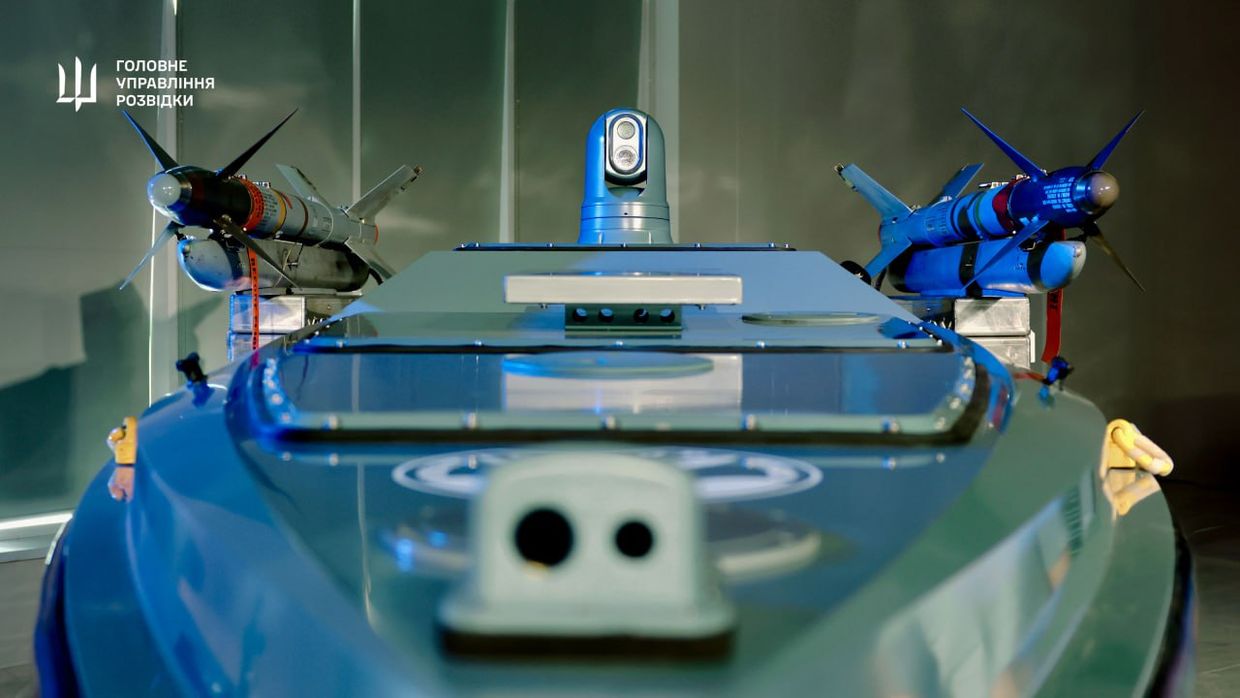
A Magura naval drone unveiled presented by Ukraine’s military intelligence. (HUR/Telegram)
Zelensky Declines Direct Participation in Talks After Putin No-Show
President Volodymyr Zelensky announced during a press conference in Ankara that he will not personally participate in the upcoming negotiations with Russia in Istanbul, instead sending a Ukrainian delegation led by Defense Minister Rustem Umerov. The decision came after Russia declined to send President Vladimir Putin despite Zelensky’s direct challenge for a face-to-face meeting.
“Out of respect for President Trump, the high level of the Turkish delegation, and President Erdogan, and since we want to achieve at least the first steps toward de-escalation, an end to the war — namely a ceasefire — I have decided to send our delegation to Istanbul,” Zelensky said.
The Ukrainian delegation will include First Deputy Foreign Minister Serhiy Kyslytsya, Deputy Security Service Chief Oleksandr Poklad, Military Intelligence Deputy Head Vadym Skibitskyi, and other national security officials, but will not include the head of the General Staff or the Security Service of Ukraine.
“We see that they, unfortunately, are very unserious about real negotiations. So far, we do not see any real decision-makers among those present,” Zelensky added during his press conference.
Russian Delegation Arrives in Istanbul Without Senior Officials
The Russian delegation has arrived in Istanbul led by presidential aide Vladimir Medinsky, who previously headed the failed 2022 negotiations. The delegation also includes Deputy Foreign Minister Mikhail Galuzin, Military Intelligence Director Igor Kostyukov, and Deputy Defense Minister Alexander Fomin.
Medinsky told reporters that they are entering the Istanbul talks with clear directives from Putin. “The president has set our objectives and defined our negotiating position,” he said, adding that the Russian team is “fully authorized to conduct negotiations.”
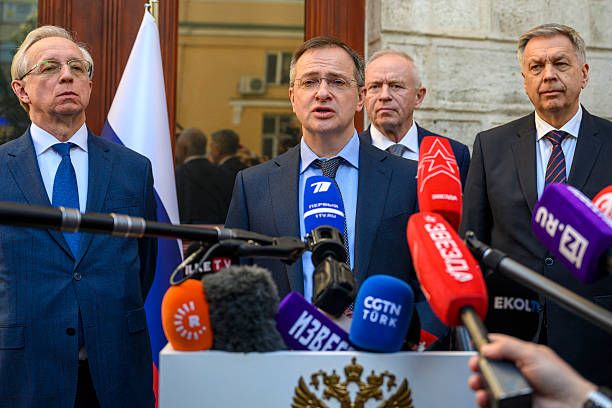
Russia’s delegation head and advisor to Putin, Vladimir Medinsky, flanked by Deputy Foreign Minister Mikhail Galuzin (L) and head of Russia military intelligence (GRU) Igor Kostyukov (R), speaks to the press in istanbul. (Yasin Akgul/AFP via Getty Images)
Notably absent from the delegation are any senior Russian officials such as Foreign Minister Sergey Lavrov or Putin’s foreign policy aide Yuri Ushakov, signaling the Kremlin’s approach to the talks.
Trump: No Progress Without Direct Putin Meeting
U.S. President Donald Trump said that peace negotiations between Russia and Ukraine will not progress without his direct involvement with Putin. “Nothing’s going to happen until Putin and I get together,” Trump told journalists aboard Air Force One before landing in Dubai during his Middle Eastern tour.
Trump, who previously suggested he might join the talks on May 16 if progress was made, downplayed Putin’s absence, saying, “Why would he go if I’m not going?” The U.S. president has repeatedly expressed impatience with the stalled peace process, having pledged to broker a swift deal between Kyiv and Moscow.
Secretary of State Marco Rubio, who arrived in Turkey on May 14, expressed skepticism about the prospects for the current talks, describing the Russian delegation as “not indicative of one that’s going to lead to a major breakthrough.” Rubio emphasized that meaningful progress would likely come only through a direct meeting between Trump and Putin.
Zelensky and Erdogan Hold Three-Hour Meeting in Ankara
Before making his decision about the Istanbul talks, Zelensky met with Turkish President Recep Tayyip Erdogan in Ankara for nearly three hours. The closed-door meeting at the Turkish presidential complex focused on the prospects for peace negotiations and Turkey’s potential role in the process.
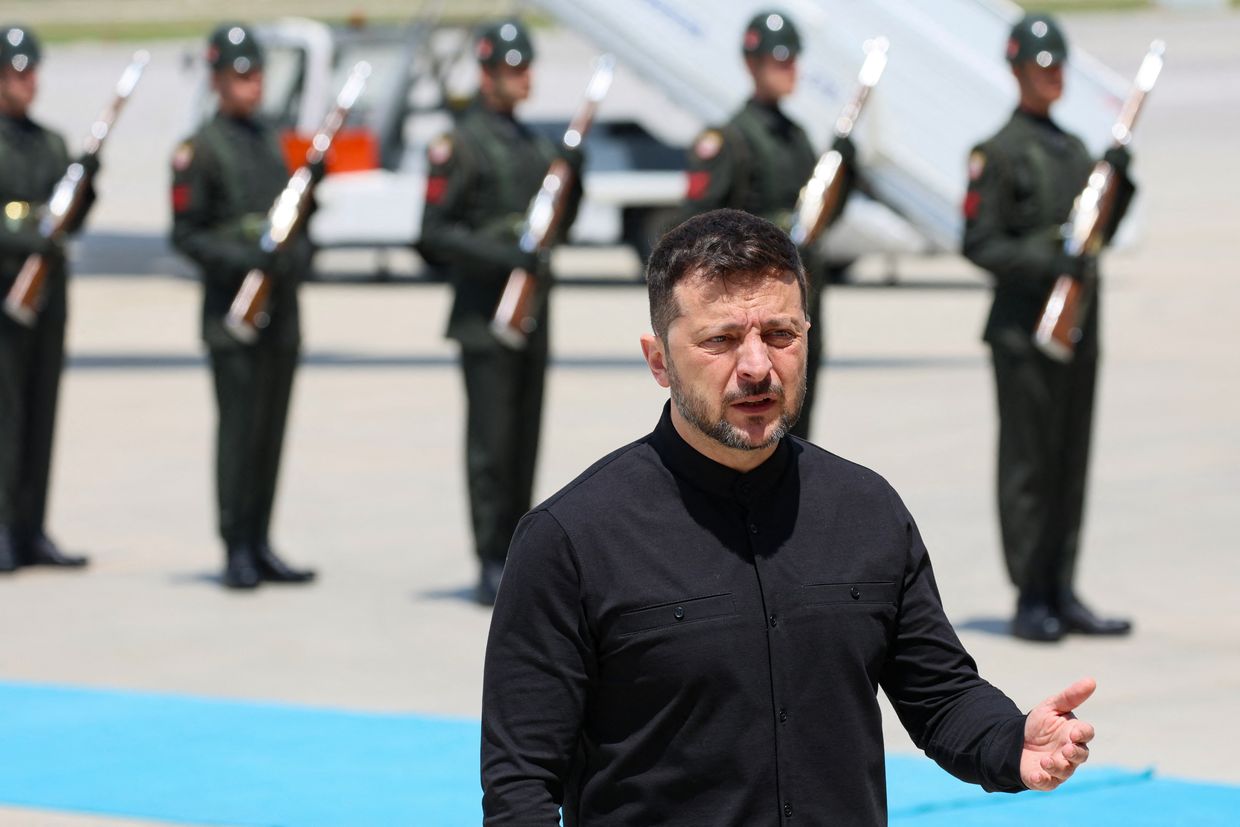
Ukrainian President Volodymyr Zelensky is welcomed after disembarking from the plane upon his arrival at Ankara airport, in Ankara, Turkey. (Adem Altan/AFP via Getty Images)
Erdogan, who has maintained ties with both Kyiv and Moscow throughout the conflict, has positioned Turkey as a key mediator in the war. Turkey previously hosted the unsuccessful — and so far, only — direct peace talks between Ukraine and Russia in 2022 and also helped broker the Black Sea grain deal that allowed safe maritime shipment until Russia pulled out of the agreement in 2023.
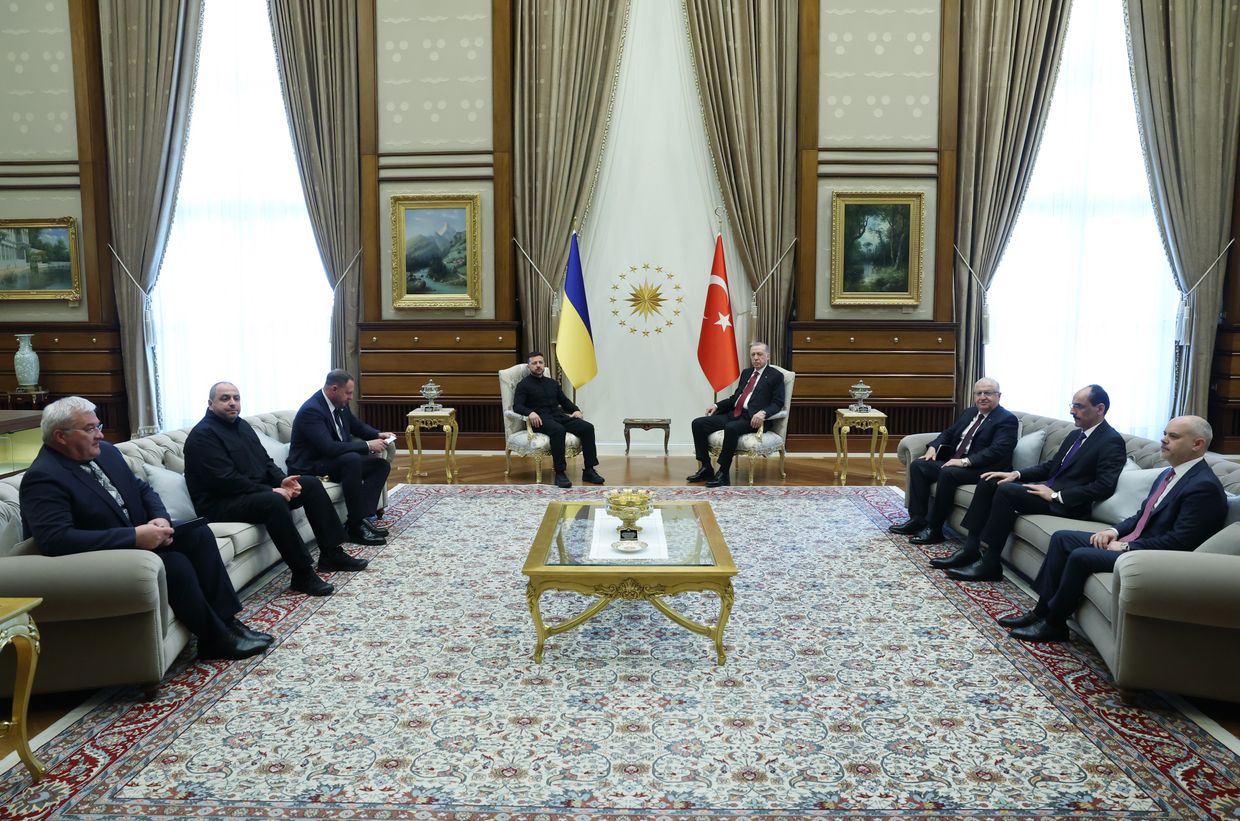
Turkish President Recep Tayyip Erdogan meets with Ukrainian President Volodymyr Zelenskyy at the Presidential Complex in Ankara, Turkiye. (TUR Presidency/ Mustafa Kamaci/Anadolu via Getty Images)
The extended length of the meeting suggested substantive discussions about the way forward, with Erdogan likely encouraging Ukrainian participation in the talks despite Putin’s absence.
Medinsky Describes Talks as Continuation of 2022 Istanbul Negotiations
Russian delegation head Vladimir Medinsky explicitly described the May 2025 talks as a continuation of the early 2022 Istanbul negotiations. “The president has set our objectives and defined our negotiating position,” Medinsky said, adding that Russia’s aim is “to achieve lasting peace by addressing the root causes of the conflict.”
Russia has repeatedly insisted that any peace agreement must include a permanent ban on Ukraine’s NATO membership, demilitarization of the country, and constitutional changes reinstating the role of Russian language, culture, and religious organizations.
The initial round of Istanbul talks took place in late March 2022, when negotiators first outlined potential terms for a peace agreement. Those negotiations failed to produce any lasting results and were followed by three years of continued conflict.
Norway to Complete F-16 Deliveries to Ukraine by End of 2025
Norway will complete its planned deliveries of F-16 fighter jets to Ukraine by the end of 2025, Defense Minister Tore O. Sandvik told NRK in an interview published on May 15.
Norway confirmed in July 2024 that it would donate several of the U.S.-made aircraft as part of Western efforts to strengthen Ukraine’s air defenses. Some jets have already been transferred, Sandvik said, but declined to specify the exact number delivered so far, citing operational security concerns and ongoing consultations with Ukrainian officials.
“The donation of Norwegian F-16s is proceeding according to plan,” Sandvik said. Last year, Norway also boosted its support to the Ukrainian Air Force with an additional 1.3 billion kroner (around $120 million), aimed at enhancing Ukraine’s ability to defend against Russian missile and drone attacks.
“With this contribution, Norway is helping to strengthen Ukraine’s air defense, in cooperation with other members of the Air Force Coalition,” Sandvik said. Norway is part of the international F-16 coalition, alongside 10 other countries, that has been training Ukrainian pilots and coordinating the delivery of Western fighter jets to Ukraine.
Ukraine’s Military Intelligence Showcases Magura Naval Drones
Ukraine’s military intelligence (HUR) on May 15 publicly presented its latest versatile Magura naval drones for the first time. These drones, along with the Security Service of Ukraine’s (SBU) Sea Baby drones, have played a crucial role in Ukraine’s naval operations in the Black Sea.
HUR’s Group 13 has deployed Magura drones to successfully hit 17 naval and aerial Russian targets. Fifteen of those targets, including two Mi-8 helicopters, two Su-30 fighter jets, and several warships of Russia’s Black Sea Fleet, have been destroyed.
Several variants of the Magura drones were displayed, including the “ship-killer” V5, the V7 capable of carrying machine guns or anti-air missiles, and the multi-platform V6P. The public presentation demonstrated Ukraine’s growing naval drone capabilities and its success in countering Russia’s conventional naval advantage.
Atesh Partisan Group Claims Railway Sabotage Near Smolensk
Members of Ukraine’s Atesh partisan group claimed responsibility for setting fire to a relay cabinet at a Russian railway track used for military shipments. The operation was allegedly carried out in Russia’s Smolensk Oblast, a western region bordering Belarus, to disrupt arms and equipment shipments to Russian forces stationed at Ukraine’s northeastern border.
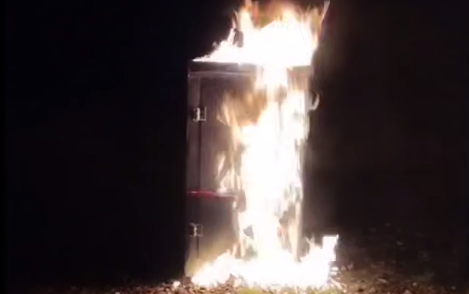
Footage that purports to show a relay cabinet of a railway near Smolensk, Russia, set ablaze by pro-Ukrainian partians. Footage published. (Atesh/Telegram)
“Thanks for the courageous steps by our partisans, Russia faced serious disruptions in timely deliveries of front-line supplies,” Atesh said on Telegram, sharing a video that purportedly shows an unidentified person setting fire to the relay cabinet at night.
According to the partisans, the targeted equipment was located close to the city of Smolensk, approximately 270 kilometers north of the Russia-Ukraine border. The group regularly commits acts of sabotage on Russian territory and in Russian-occupied areas of Ukraine to disrupt Russian military logistics.
Belarus Deploys Military Personnel to Russia for Advanced Training
Belarus is deploying military personnel to Russia for advanced training to prepare them to become instructors on their return, the Belarusian Ministry of Defense announced on May 15.
According to the official statement, the servicemen were selected from various units of the Belarusian Armed Forces and are undergoing training at the 333rd Combat Training Center, located near Mulino in Russia’s Nizhny Novgorod region.
The training course, which covers firearms, tactics, medical instruction, and more, is based on lessons drawn from “modern armed conflicts”—likely a reference to Russia’s ongoing war against Ukraine. Upon completion, the Belarusian trainees will return to Belarus to serve as instructors for their own personnel.
The 333rd center, which integrates traditional field exercises with computer-based simulators for armored vehicle crews, was itself struck by a Ukrainian drone attack in March. A Ukrainian Liutyi drone hit the facility on March 14, damaging one of the buildings that housed interactive firing ranges and injuring Russian troops.
The Belarusian training deployment follows comments from President Alexander Lukashenko in early March, when he ordered defense officials to coordinate training missions to Russia focused on drone warfare.
Putin Extends Russia’s Defense Strategy Through 2027
As diplomatic efforts unfolded in Turkey, Russian President Vladimir Putin extended the country’s current defense strategy through 2027, Russian state-controlled media reported. The extension of the current defense plan, initially set for 2021-2025, was confirmed by the Kremlin, though specific details remain classified.
The original plan was enacted in January 2021, just over a year before Russia launched its full-scale invasion of Ukraine. The timing of the extension came just hours after Zelensky and the Ukrainian delegation landed in Turkey ahead of the anticipated peace talks in Istanbul, suggesting a disconnect between Russia’s military planning and diplomatic engagement.
Putin Appoints Ground Forces Commander to Security Council
Russian President Vladimir Putin appointed General Oleg Saliukov, the commander of the Russian Ground Forces, as deputy secretary of the Security Council. The appointment came amid media reports claiming that Russia is preparing a major offensive in Ukraine despite ongoing peace efforts.
Saliukov, who turns 70 on May 21, had led Russia’s Ground Forces and the Moscow Garrison since 2014. Known for overseeing annual Victory Day parades on Red Square from 2014 through 2025, he is currently under Western sanctions for his role in Russia’s full-scale invasion of Ukraine.
Sergei Shoigu, Russia’s former defense minister, has headed the Security Council since May 2024 and now has several deputies, including Saliukov. It remains unclear who will replace Saliukov as commander of the Ground Forces.
NATO Foreign Ministers Hold Informal Meeting in Antalya
NATO foreign ministers gathered in Antalya, Turkey, for an informal meeting coinciding with the planned peace talks in Istanbul. The ministers discussed increasing defense spending, with NATO allies beginning work on a plan to meet Trump’s call for each country to allocate 5% of GDP to their militaries by 2032.
NATO Secretary General Mark Rutte is reportedly pushing allies to commit to 3.5% of GDP for defense over the next seven years, plus an additional 1.5% for broader defense-related areas. Currently, 24 of NATO’s 32 members meet the 2% target, with Poland (4.12%), Estonia (3.43%), and the U.S. (3.38%) leading the way.
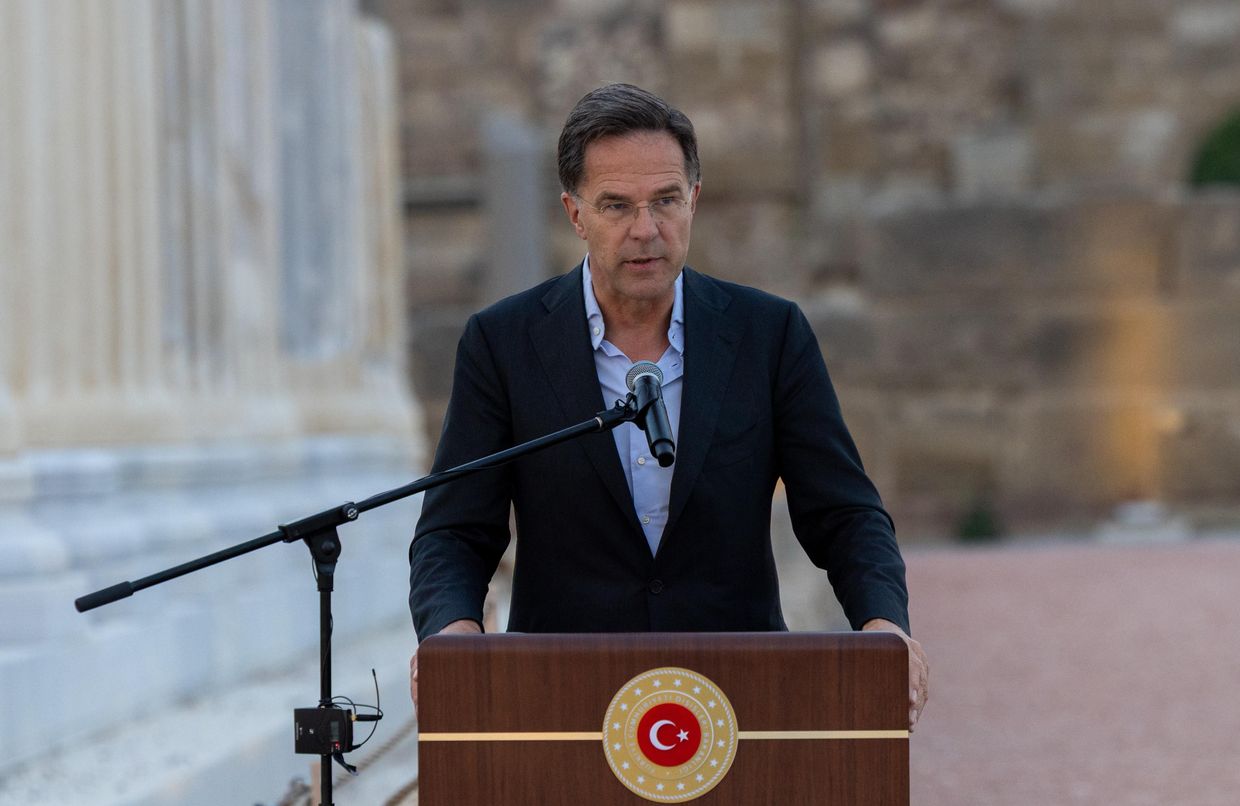
NATO Secretary General Mark Rutte speaks during a dinner held in honor of foreign ministers participating in the Informal Meeting of NATO Foreign Ministers in Antalya, Turkey. (Murat Gok/Anadolu via Getty Images)
Estonian Foreign Minister Margus Tsahkna criticized Putin’s decision to send junior aides to the Istanbul peace talks, calling it a “slap in the face.” Latvia’s chief diplomat, Baiba Braze, commented that there are no indications that Russia is genuinely seeking peace in Ukraine.
Transatlantic ‘Quint’ Foreign Ministers Meet on NATO Sidelines
U.S. Secretary of State Marco Rubio met with the other Transatlantic Quint Foreign Ministers—Jean-Noël Barrot (France), Johann Wadephul (Germany), Antonio Tajani (Italy), and David Lammy (the UK)—on the sidelines of the NATO Informal Ministerial Meeting in Antalya.
According to State Department Spokesperson Tammy Bruce, Rubio briefed the ministers on President Trump’s “efforts to halt the senseless bloodshed in Ukraine and emphasized that European leadership is critical for getting Russia and Ukraine to negotiate in good faith for a swift and durable peace settlement.”
“The Secretary and Foreign Ministers agreed on the urgent need to increase NATO burden-sharing and European defense spending,” Bruce said in a readout of the meeting. Rubio also stressed that U.S. defense companies are integral to the transatlantic industrial base and should not be sidelined in Europe’s rearmament efforts.
The ministers also discussed shared priorities, including preventing Iran from developing or obtaining a nuclear weapon and countering China’s influence.
NATO Begins Work on Plan to Increase Defense Spending After Trump Criticism
NATO allies have begun working on a plan to increase defense spending, aiming to meet U.S. President Donald Trump’s call for each country to allocate 5% of GDP to their militaries, Bloomberg reported on May 15.
Citing diplomats familiar with the issue, Bloomberg said progress is being made toward reaching the goal by 2032. The development of the plan comes ahead of a NATO summit set to take place in The Hague in June.
Trump has long demanded that NATO allies increase their military spending, previously calling for the alliance to raise its benchmark from 2% to 5% of GDP. Defense spending at the level Trump is calling for would be the largest increase in military expenditures by Western allies since the Cold War, as NATO members bolster their defenses in response to Russia’s invasion of Ukraine.
NATO Secretary General Mark Rutte is now pushing allies to commit to 3.5% of GDP for defense over the next seven years, plus an additional 1.5% for broader defense-related areas, Bloomberg reports. NATO Ministers of Foreign Affairs are discussing the defense spending during the informal meeting in Antalya, Turkey, on May 14–15.
Ministers will discuss what qualifies under the 1.5% for broader defense-related areas, and it’s still unclear if this would involve new or existing spending.
Pope Leo XIV Receives List of Ukrainian POWs at Vatican
Pope Leo XIV was handed a list of Ukrainian soldiers in Russian captivity during a ceremony at the Vatican, Ukraine’s Coordination Headquarters for the Treatment of Prisoners of War reported. A representative of Ukrainian prisoners of war families “personally” handed him the document during the Jubilee of Eastern Churches held on May 12-14.
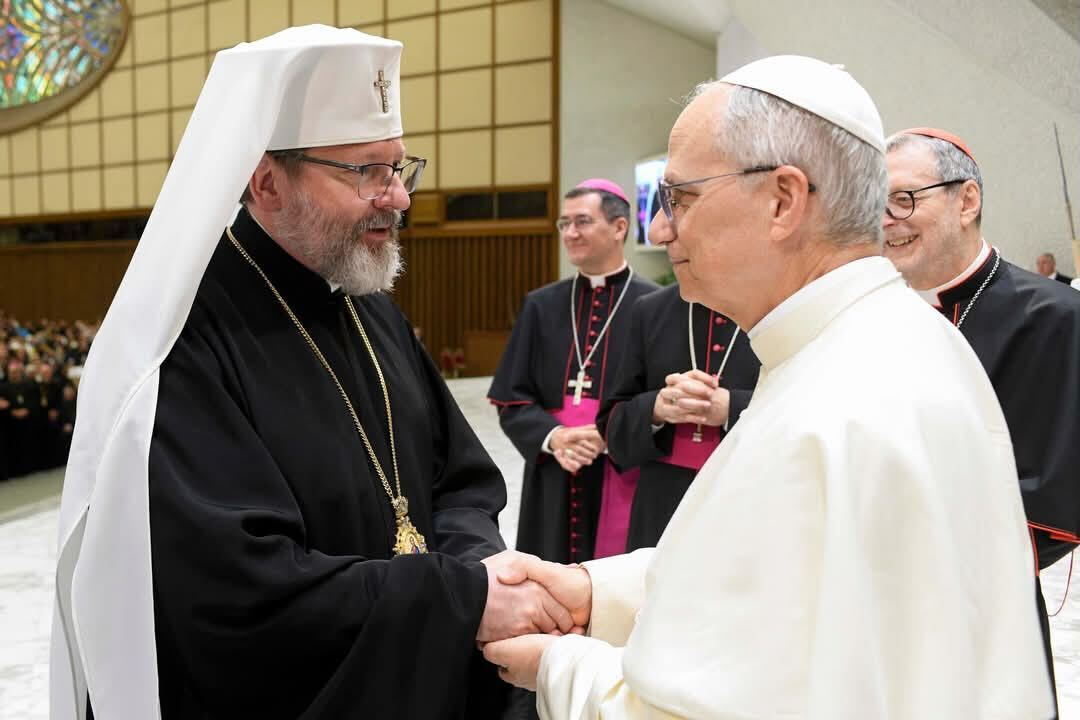
Head of the Ukrainian Greek Catholic Church Sviatoslav Shevchuk meets Pope Leo XIV at the Vatican in a photo released by the Coordination Headquarters for the Treatment of Prisoners of War. (Coordination Headquarters for the Treatment of Prisoners of War)
“My heart goes out to the suffering and beloved people of Ukraine. Let us do everything we can to bring about a true peace, a just and lasting peace, as soon as possible,” Pope Leo XIV said. “Let all the prisoners be released and let the children return to their families.”
There have been 64 prisoner swaps since Russia’s full-scale invasion began in February 2022, and five during 2025. The Ukrainian delegation present in the Vatican included the head of the Ukrainian Greek Catholic Church, Sviatoslav Shevchuk, who congratulated Pope Leo XIV on his election.
Russian Jet Violates NATO Airspace During Tanker Interception
A Russian military jet “violated NATO territory” after the Estonian Navy attempted to intercept a tanker thought to belong to Moscow’s “shadow fleet,” Estonian Foreign Minister Margus Tsahkna said. Speaking at the NATO meeting in Antalya, Tsahkna said the Russian aircraft was deployed to “check the situation” after the ship refused to cooperate with Estonian authorities and was being escorted back to Russian waters.
“And this fighter jet violated NATO territory for close to one minute,” Tsahkna said, adding: “The Russian Federation is ready to protect the ‘shadow fleet’… the situation is really serious.”
According to Estonian media outlet ERR, Russia sent a Sukhoi Su-35 fighter jet to check on the status of the tanker Jaguar, which was sailing through international waters in the Gulf of Finland. Estonian authorities said the tanker lacked a flag, meaning it was not authorized to sail in international waters.
To carry out the interception, Estonia deployed an AgustaWestland AW139 helicopter, an M28 Skytruck reconnaissance aircraft, and the EML Raju patrol vessel, according to Militarny. After the incident on May 13, the tanker returned to the Russian port of Primorsk.
Polish Parliament Passes Bill to Waive Visa Requirements for Foreign Volunteers
Ukraine’s parliament, the Verkhovna Rada, passed the first reading of a bill that aims to scrap visa requirements for foreign volunteers during martial law and for one year after its termination. The motion was supported by 277 lawmakers.
Under the proposed legislation, foreign volunteers working with accredited organizations would be able to apply for a residence permit directly once inside Ukraine, without needing to obtain a long-term D-type visa at a Ukrainian consulate abroad.
The bill also stipulates that foreigners who entered Ukraine as volunteers after February 24, 2022—the day of Russia’s full-scale invasion—will be legally in Ukraine. The bill will likely need to go through another reading, then be endorsed by the president to become law, with the timeline for implementation remaining unclear.
Currently, visa fees differ based on nationality as they are determined reciprocally with the country of issue. For instance, US passport holders need to pay $182 for a volunteer D visa, while UK passport holders are required to pay $333.
Reports Emerge of U.S. Proposal to Revive NATO-Russia Council
The United States is reportedly proposing to revive the NATO-Russia Council as part of a broader American plan to end the war in Ukraine, according to Bloomberg, citing unnamed sources. The NATO-Russia Council, a forum for military and political dialogue frozen since Russia’s full-scale invasion of Ukraine in 2022, was created in 2002 to promote cooperation between NATO and Russia.
Originally designed as a forum where NATO members and Russia could work as equal partners on shared security issues, the NRC has not convened since January 2022. While formal cooperation was suspended after Russia’s 2014 illegal annexation of Crimea, the council remained a key channel for communication until ties were effectively severed following the 2022 invasion.
The proposal to revive this mechanism represents a significant potential shift in the diplomatic landscape, though it remains unclear how this would be integrated into current peace efforts or how Ukraine and other NATO members would respond to such an initiative.
British Prime Minister Accuses Putin of “Dragging His Feet” on Peace
U.K. Prime Minister Keir Starmer accused Russian President Vladimir Putin of “dragging his feet” and obstructing peace efforts in Ukraine after Putin declined to attend face-to-face talks with Ukrainian President Volodymyr Zelensky in Turkey.
“What’s happened today is further evidence that it’s Putin who is dragging his feet,” Starmer said. “It is Putin who is causing the delay in a ceasefire.”
Starmer said Ukraine had already agreed to a 30-day unconditional ceasefire and that it was Moscow that continued to block progress. “Ukraine has long been clear, several months ago now, that they would have a 30-day unconditional ceasefire, and we have long said that it’s Putin who is standing in the way of that peace,” he said.
Looking Ahead: Expectations for Istanbul Talks
As the day concluded, the stage was set for potential negotiations in Istanbul on May 16 with lowered expectations. The Ukrainian delegation led by Defense Minister Umerov will meet with the Russian delegation headed by Medinsky, with Turkish officials likely to facilitate.
U.S. Secretary of State Rubio and Trump’s special envoy Steve Witkoff are expected to join discussions on May 16. However, with both Putin and Zelensky absent, and Trump declaring that real progress awaits his direct involvement with Putin, substantive breakthroughs appear unlikely.
Nevertheless, these talks represent the first direct negotiations between Ukrainian and Russian officials since the early days of the full-scale invasion, potentially marking a small but significant step in a long diplomatic process. The immediate focus remains on establishing a ceasefire, though the prospect of comprehensive peace remains distant given the continuing military activities and divergent positions of the key parties.
